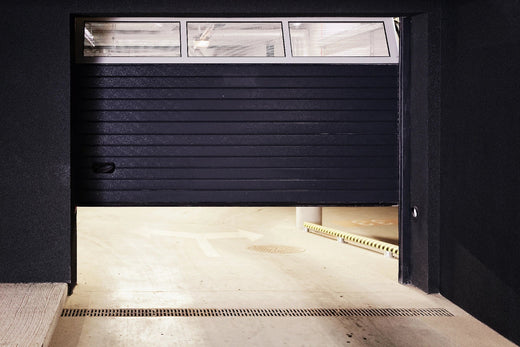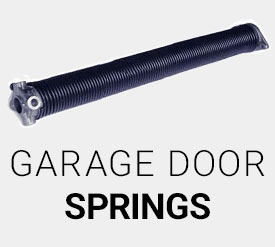Garage door torsion springs play a critical role in the smooth operation of your garage door. These tightly wound springs bear the immense weight of the door, making it easy to open and close. However, like any mechanical component, torsion springs are susceptible to wear and tear over time. Broken garage torsion springs can be both inconvenient and hazardous. Understanding why they break and how to prevent such issues is essential for maintaining the safety and functionality of your garage door.
Common Reasons for Broken Garage Torsion Springs
Garage door torsion springs are critical components of a garage door system. They enable smooth and efficient operation of your garage door. However, they are not immune to wear and damage. Below are some of the most common reasons why torsion springs fail. This often leads to the inconvenience of a malfunctioning garage door.
Wear and Tear
The main cause of torsion spring failure is regular wear and tear. These springs are engineered to endure a predetermined number of cycles. One cycle is defined as the garage door opening and closing once. Standard torsion springs are often rated for 10,000 cycles.
Although this might seem like a substantial lifespan. But frequent daily use can quickly deplete the spring's capacity. As the springs near the end of their lifecycle, the likelihood of snapping increases significantly. This potentially leaves your garage door nonfunctional.
Rust Formation
Rust is another significant factor that can be responsible for broken garage torsion springs. Long exposure to moisture causes rust to develop on the metal surface, eroding its strength. Over time, this corrosion weakens the springs. Therefore, it makes them susceptible to breaking under the stress of everyday use. Regular inspection and preventative measures such as applying a protective coating or lubricant can help mitigate this issue.
Improper Maintenance
Neglecting routine maintenance can accelerate the deterioration of torsion springs. Without regular lubrication, the extreme friction between components can lead to early wear and tear.
Additionally, failing to conduct periodic inspections may result in minor issues going unnoticed. So, this eventually causes larger and more costly failures. Proper upkeep ensures the springs remain in optimal condition, extending their lifespan.
Temperature Fluctuations
Torsion springs are also vulnerable to extreme temperature changes. Constant expansion and contraction of the metal due to fluctuating temperatures can weaken the material over time. This thermal pressure combined with regular operational strain increases the chances of the springs breaking. Homeowners in regions with harsh winters or scorching summers should pay extra attention to their garage door systems.
Wrong Installation
Improper installation of torsion springs can lead to sudden failure. Using springs with incorrect specifications such as those not suited to the garage door's weight, places excessive stress on the components. This misalignment can cause the springs to function inefficiently.
Unbalanced Garage Door
An unbalanced garage door can exert uneven pressure on torsion springs. So, this will cause them to wear out faster than usual. Common causes of imbalance include misaligned tracks, damaged rollers, or improperly adjusted tension settings. Regular checks and adjustments can help maintain balance. Therefore, it prevents unnecessary strain on the springs.
Understanding these common causes of torsion spring failure can help you take preventative measures. Therefore, this will ensure the longer life of your garage door system. Regular maintenance, timely inspections, and professional installation are essential to save yourself from broken garage torsion springs.
Signs of a Broken Torsion Spring
A broken torsion spring can disrupt the smooth operation of your garage door. So this can even further pose safety risks. Identifying the early warning signs of a broken torsion spring can help you address the problem early on. Therefore, it will help in preventing further damage or inconvenience.
The Door Won’t Open Properly
One of the most apparent signs of a broken torsion spring is difficulty in opening the garage door. A damaged spring can no longer support the door’s weight effectively. So, this makes it feel unusually heavy or immovable.
In some cases, the door may partially lift and then stop. Or the opener may struggle to function, indicating that the spring is no longer providing the necessary tension.
Loud Banging Noise
Another common sign is a loud banging or snapping noise. When a torsion spring breaks, it often releases a significant amount of stored energy suddenly. So, this creates a sound similar to a firecracker or a heavy object falling. If you hear such a sound and notice issues with your garage door, it’s likely the broken garage torsion spring.
Visible Gap in the Spring
Inspecting the torsion spring can also reveal visible damage. When a spring breaks, the coil typically separates, leaving a noticeable gap in the otherwise tightly wound spring. This gap is a clear indication that the spring is no longer functional and needs to be replaced.
Slower or Jerky Movements
A damaged torsion spring can cause your garage door to move erratically. Instead of the smooth and even motion typical of a properly functioning door, you may notice uneven or jerky movements. The door may also move slower than usual or stop suddenly during operation. These irregularities occur because the spring is no longer distributing tension evenly.
By paying close attention to these warning signs, you can address torsion spring issues early. This will help in ensuring the safety and efficiency of your garage door system. If you notice any of these signs, it’s best to contact a professional technician to inspect and replace the spring. This is because attempting repairs yourself can be dangerous.
Preventing Torsion Spring Breakage
While torsion springs will eventually wear out, proper care and maintenance can significantly extend their lifespan. Here are several approaches to help prevent broken garage torsion springs:
Perform Regular Inspections
First and foremost, inspect your torsion springs regularly. Look for signs of rust, wear, or gaps in the coils. If you notice anything unusual, address it as soon as possible to prevent further damage.
Lubricate the Springs
Lubrication is a simple yet effective way to reduce friction and prevent rust. Use a high-quality garage door lubricant to coat the springs. This will not only extend their life, but also help the door operate more smoothly.
Balance the Door
An unbalanced garage door can place excessive strain on the springs. Test the balance by disconnecting the opener and manually moving the door halfway up. If it doesn’t stay in place, it’s a sign the door is unbalanced and needs adjustment by a professional.
Limit Daily Use
If possible, limit how often you open and close your garage door. For example, consider using other entryways if you frequently enter and exit your home. Reducing the number of cycles can help extend the spring’s lifespan. Therefore, it will help you from a broken garage torsion spring.
Replace Springs in Pairs
When one spring breaks, it’s often a good idea to replace both. This is because it reduces the likelihood of the second spring breaking shortly after. Moreover, it will help in distributing an equal weight on both sides of a garage door.
Protect Against Rust
To prevent rust formation, keep your garage dry and provide good ventilation. If your garage is prone to humidity, consider using a dehumidifier or rust-preventive sprays on the springs.
Schedule Professional Maintenance
Lastly, scheduling annual maintenance with a garage door professional can make a huge difference. Professionals can identify potential issues early. Moreover, they will perform necessary adjustments or replacements safely.
Why Prevention Matters
Preventing a broken garage torsion spring is not just about saving money, it’s also about safety and convenience.
● A broken torsion spring can cause the garage door to slam shut unexpectedly, posing a significant risk of injury to anyone nearby, including children and pets. Preventative measures help avoid these dangerous situations.
● A malfunctioning garage door can disrupt your daily routine, especially if it becomes stuck and prevents you from accessing your vehicle or belongings. Prevention ensures seamless operation.
● A garage door that cannot close properly due to a broken spring leaves your home vulnerable to intruders. Proactively maintaining the springs ensures your property remains secure.
● Addressing minor wear and tear early can prevent costly repairs or replacements later. Regular maintenance extends the lifespan of the torsion springs and other components.
● By preventing the possibility of broken torsion springs, you reduce strain on the garage door opener and other parts; thus, making sure that the entire system lasts longer and operates more efficiently.
● A sudden failure can leave you unable to open or close the garage door when you need it most. Prevention reduces the chances of inconvenient breakdowns.
● Well-maintained garage doors are a valuable asset for potential homebuyers, showcasing that the property is well cared for.
By taking proactive steps such as regular maintenance and proper use, you can minimize the risks and make sure that your garage door operates smoothly for years to come. Other than this, bands like Garage Door Nation can be a good reliable place for everything related to your garage door. Whether it is buying required products like garage door parts and tools or it is tutorials related to the maintenance of your garage doors.
Conclusion
In conclusion, garage door torsion springs are essential yet vulnerable components of your garage door system. They commonly break due to wear and tear, rust, improper maintenance, temperature changes, and other factors.
However, by understanding these causes and implementing preventive measures, you can significantly extend the life of your torsion springs. Regular inspections, lubrication, balancing the door, and professional maintenance are key to keeping your garage door in top condition. Not only will this save you from costly repairs, but it will also enhance the safety and functionality of your home.





